Meyopimatisiwin Wisdom
Indigenous peoples have and continue to be stewards of the land, and have forged a strong relationship with the land and their ancestors in important ecological ways. It is urgent that oral traditional knowledge and the wisdom of the Elders be preserved for generations to come and be shared with the young people of today, and it is important that they learn good environmental practices and the sustainability of the ecosystem and the land. The Elders also told stories about how they came to live in this area, and how they worked and survived on the land. This project would have been impossible without the collaboration and wisdom of our Elders from the Cree, Beaver, and Dene communities.
-
Elders and Community Experts of Saulteau First Nation & West Moberly First Nation (ordered by last name)
-
George Davis
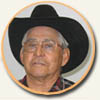 George
was born in 1932, and raised on the Saulteau First Nation. His parents
were the late Philip Davis and Madeline Desjarlais. Trapping and
hunting, near Jackfish Lake and Graves Creek, was his way of life.
George’s wife was the late Janet Campbell from the Kelly Lake area.
They didn’t have any children, but raised foster children. George
worked in the logging business at portable sawmills in the area,
using crosscut saws, and horse logging. He also worked for farmers
in the area, stooking bundles in the fields and picking rocks. Their
mode of transportation was by team of horses and wagon. They often
rode horses the 7 miles to school. George was a hunting guide in
the mountains for 40 years. He also participated in the rodeos, and
was a bareback cowboy. They rode for money, not trophies or buckles.
George
was born in 1932, and raised on the Saulteau First Nation. His parents
were the late Philip Davis and Madeline Desjarlais. Trapping and
hunting, near Jackfish Lake and Graves Creek, was his way of life.
George’s wife was the late Janet Campbell from the Kelly Lake area.
They didn’t have any children, but raised foster children. George
worked in the logging business at portable sawmills in the area,
using crosscut saws, and horse logging. He also worked for farmers
in the area, stooking bundles in the fields and picking rocks. Their
mode of transportation was by team of horses and wagon. They often
rode horses the 7 miles to school. George was a hunting guide in
the mountains for 40 years. He also participated in the rodeos, and
was a bareback cowboy. They rode for money, not trophies or buckles. -
Melvin Davis
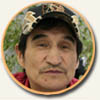 Melvin’s geat grandfather moved to Moberly Lake from the Prairies, and the
stories Melvin knows about the area come from him. Growing up, Melvin
trapped and hunted about ten miles, as the crow flies, from Moberly
Lake. When he hunted up there, he trapped animals that included muskrats,
squirrels, and marmots. Marmots were also referred to as whistlers,
and taste like pork. When Melvin was trapping and hunting he would
spend winters there. Any meat he caught we made into dry meat, so
that it would keep. In the wintertime, some meat could just be kept
outside so it would freeze. Growing up they didn’t have stove- they
cooked over a cook fire. Depending on where they were, they would
cook over campfires and in teepees. Most of the cooking was done
over the fire.
Melvin’s geat grandfather moved to Moberly Lake from the Prairies, and the
stories Melvin knows about the area come from him. Growing up, Melvin
trapped and hunted about ten miles, as the crow flies, from Moberly
Lake. When he hunted up there, he trapped animals that included muskrats,
squirrels, and marmots. Marmots were also referred to as whistlers,
and taste like pork. When Melvin was trapping and hunting he would
spend winters there. Any meat he caught we made into dry meat, so
that it would keep. In the wintertime, some meat could just be kept
outside so it would freeze. Growing up they didn’t have stove- they
cooked over a cook fire. Depending on where they were, they would
cook over campfires and in teepees. Most of the cooking was done
over the fire. -
Virginia Davis-Lalonde
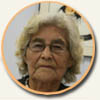 Virginia
was born near the Moberly Lake Bridge in 1924. Her mother was Madeline
Desjarlais, and her dad was Philip Davis. They lived at the east
end of Moberly Lake, called ‘Sagitawa’. They lived in a log house
near her grandparents, Eva Calliou and James Desjarlais. When Virginia
was seven years old, her family moved to the ‘flats’ area. She went
to school for three years. It was a long way to go, so they often
rode horseback to school. Her dad was a trapper. In February 1945,
she married Pierre Lalonde. She raised 14 children, and lived at
Moberly Lake all her life. Virginia and her husband were trappers,
and trapped to survive. She still tans hides the old way – soaking,
stretching, fleshing, scraping, and smoking. She makes moccasins
and mukluks with the hides.
Virginia
was born near the Moberly Lake Bridge in 1924. Her mother was Madeline
Desjarlais, and her dad was Philip Davis. They lived at the east
end of Moberly Lake, called ‘Sagitawa’. They lived in a log house
near her grandparents, Eva Calliou and James Desjarlais. When Virginia
was seven years old, her family moved to the ‘flats’ area. She went
to school for three years. It was a long way to go, so they often
rode horseback to school. Her dad was a trapper. In February 1945,
she married Pierre Lalonde. She raised 14 children, and lived at
Moberly Lake all her life. Virginia and her husband were trappers,
and trapped to survive. She still tans hides the old way – soaking,
stretching, fleshing, scraping, and smoking. She makes moccasins
and mukluks with the hides. -
Howard Gauthier
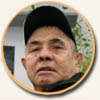 Howard
has never heard of anybody finding sweet grass around Moberly Lake,
they usually just get it from down south. When they were little kids
going to school in Moberly Lake, they used to walk the two or three
miles to school. It didn’t matter how cold it was, they walked. Finally
they got a team of horses and it was like our school bus. Howard
would drive the team of horses to school and pick up all the kids
in the west-end. He lived in Cameron Lakes most of his life with
his Auntie. When he was thirteen he started riding bulls. Howard
quit school in grade eight when he was fifteen and started working.
It seems like he hasn’t stopped working since he started. Now Howard
just stays home and looks after his family.
Howard
has never heard of anybody finding sweet grass around Moberly Lake,
they usually just get it from down south. When they were little kids
going to school in Moberly Lake, they used to walk the two or three
miles to school. It didn’t matter how cold it was, they walked. Finally
they got a team of horses and it was like our school bus. Howard
would drive the team of horses to school and pick up all the kids
in the west-end. He lived in Cameron Lakes most of his life with
his Auntie. When he was thirteen he started riding bulls. Howard
quit school in grade eight when he was fifteen and started working.
It seems like he hasn’t stopped working since he started. Now Howard
just stays home and looks after his family. -
Lillian Maggie Gauthier
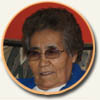 Lillian’s
maiden name is Crying Man. She was born and raised in West Moberly
in 1939. When she was sixteen years old, Lillian married Oliver Gauthier,
and moved to the Saulteau First Nation, near Moberly Lake. She raised
nine children. Her husband worked in sawmills, and also lived the
traditional way of life by hunting and trapping. In the summer they
took the whole family and went to the trap-line to hunt and fish.
They still tan hides and make moccasins, and continue to enjoy the
traditional way of life. Lillian loves living here, and says she
will never leave.
Lillian’s
maiden name is Crying Man. She was born and raised in West Moberly
in 1939. When she was sixteen years old, Lillian married Oliver Gauthier,
and moved to the Saulteau First Nation, near Moberly Lake. She raised
nine children. Her husband worked in sawmills, and also lived the
traditional way of life by hunting and trapping. In the summer they
took the whole family and went to the trap-line to hunt and fish.
They still tan hides and make moccasins, and continue to enjoy the
traditional way of life. Lillian loves living here, and says she
will never leave. -
Mathilda Hiebert
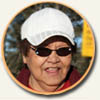 When
Mathilda went to school, it was not in the same place where the Moberly
Lake School is now. She had to walk nine miles to the school, which
was down by the lake. When some children were being sent to residential
school, Mathilda was a small girl and doesn’t really remember. Mathilda
never went to residential school.
When
Mathilda went to school, it was not in the same place where the Moberly
Lake School is now. She had to walk nine miles to the school, which
was down by the lake. When some children were being sent to residential
school, Mathilda was a small girl and doesn’t really remember. Mathilda
never went to residential school. -
Della Napolean
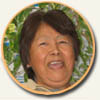 Della was born and raised at the east end of Moberly Lake, in 1950.
Her grandfather Dokkie was the one and only hereditary chief of the
West Moberly Lake First Nation. Her father was Cree & Iroquois,
Mr. Fred Napoleon. They sustained and lived off the land, and lived
a traditional life. Della was taught at an early age to know the
traditional culture and the contemporary way of life. Sharing was
very important in her family. She went to school at Moberly Lake,
and transferred to Chetwynd to graduate in 1971. She then went to
post-secondary at Northern Lights College. She graduated with fashion
design at AVC in Grouard. Della also enrolled in the Cree Instructor’s
program at Muskwachees College in Hobbema, and just recently completed
a Fine Arts degree at Enowkin Centre in Penticton. Currently she
is attending the University of Victoria in the Bachelor of Fine Arts
program. Della has two beautiful daughters who are professional career
women.
Della was born and raised at the east end of Moberly Lake, in 1950.
Her grandfather Dokkie was the one and only hereditary chief of the
West Moberly Lake First Nation. Her father was Cree & Iroquois,
Mr. Fred Napoleon. They sustained and lived off the land, and lived
a traditional life. Della was taught at an early age to know the
traditional culture and the contemporary way of life. Sharing was
very important in her family. She went to school at Moberly Lake,
and transferred to Chetwynd to graduate in 1971. She then went to
post-secondary at Northern Lights College. She graduated with fashion
design at AVC in Grouard. Della also enrolled in the Cree Instructor’s
program at Muskwachees College in Hobbema, and just recently completed
a Fine Arts degree at Enowkin Centre in Penticton. Currently she
is attending the University of Victoria in the Bachelor of Fine Arts
program. Della has two beautiful daughters who are professional career
women. -
Earl Parenteau
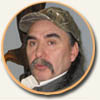 Earl’s
family is Cree-Métis, originally from the Red River area, in Manitoba.
He was born and raised in Paddle Prairie, Alberta. Nearly 25 years
ago Earl moved to Moberly Lake, after marrying Penny Davis. They
have four beautiful children, whom they are very proud of. Both Penny
and Earl love living and working in the mountains. Earl’s interests
have always been related to the traditional way of life: living off
and learning the history of the land, and hunting and guiding in
the beautiful mountains of northern British Columbia. He truly enjoy
living and working with the people of the Saulteau First Nation,
and the Elders of this community. Earl gives thanks to the holy ones
that have gone before us for the many gifts of the land, the water,
and the sun.
Earl’s
family is Cree-Métis, originally from the Red River area, in Manitoba.
He was born and raised in Paddle Prairie, Alberta. Nearly 25 years
ago Earl moved to Moberly Lake, after marrying Penny Davis. They
have four beautiful children, whom they are very proud of. Both Penny
and Earl love living and working in the mountains. Earl’s interests
have always been related to the traditional way of life: living off
and learning the history of the land, and hunting and guiding in
the beautiful mountains of northern British Columbia. He truly enjoy
living and working with the people of the Saulteau First Nation,
and the Elders of this community. Earl gives thanks to the holy ones
that have gone before us for the many gifts of the land, the water,
and the sun. -
Simon Redhead
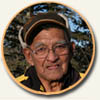 Simon
is a Cree from Sturgeon Lake First Nation, near Valleyview, Alberta.
He moved here to the Moberly Lake area in 1938, when he was 17 years
old. Simon lived with his half-brother Slim Garrbitt. He used to
play the fiddle for the dances. Trapping was their way of life. Simon
married Victoria Belcourt when he was 26 years old. They raised eleven
children at Jackfish Lake. He worked at the sawmills, and did construction
on highways to support my family. He walked all the way to Parsnip
River, near Pine Pass, with a saw on his back. Simon used to haul
freight across the river by hand. They used to walk everywhere. In
the old days they didn’t have to carry water with them; they could
drink from any stream or pond. They had to break wild horses to ride.
Simon
is a Cree from Sturgeon Lake First Nation, near Valleyview, Alberta.
He moved here to the Moberly Lake area in 1938, when he was 17 years
old. Simon lived with his half-brother Slim Garrbitt. He used to
play the fiddle for the dances. Trapping was their way of life. Simon
married Victoria Belcourt when he was 26 years old. They raised eleven
children at Jackfish Lake. He worked at the sawmills, and did construction
on highways to support my family. He walked all the way to Parsnip
River, near Pine Pass, with a saw on his back. Simon used to haul
freight across the river by hand. They used to walk everywhere. In
the old days they didn’t have to carry water with them; they could
drink from any stream or pond. They had to break wild horses to ride. -
VICTORIA DAVIS
 Victoria’s
maiden name was Napoleon. Her mother was Eva Campbell and her dad
was the late Felix Napoleon. She was born and raised in Moberly
Lake. She has lived here all her life, and went to school at Moberly
Lake. To make a living, she worked for families, babysitting, cleaning,
washing and ironing clothes for $1.00 per day. Victoria hunted
in the mountains from the age of 14. She was 18 years old when
she married Elmer Davis. Victoria raised nine children. Her husband
was a caterpillar operator, building highways, and he worked in
the mines for 22 years. He also was a hunting guide in the mountains,
during the summer months. They also trapped squirrels, marten,
fishers, and coyotes. Victoria canned berries and planted a garden
to support my family. They dried, canned, and smoked the mea to
preserve it. When Victoria was younger, she competed in the rodeos
– barrel racing and cow riding. For nineteen years she cooked on
oilrigs and guiding camps in the mountains. Victoria now has seventeen
grandchildren and fifteen great-grandchildren. She continues to
live the traditional ways, by catering to functions, gardening,
canning, hunting, and fishing.
Victoria’s
maiden name was Napoleon. Her mother was Eva Campbell and her dad
was the late Felix Napoleon. She was born and raised in Moberly
Lake. She has lived here all her life, and went to school at Moberly
Lake. To make a living, she worked for families, babysitting, cleaning,
washing and ironing clothes for $1.00 per day. Victoria hunted
in the mountains from the age of 14. She was 18 years old when
she married Elmer Davis. Victoria raised nine children. Her husband
was a caterpillar operator, building highways, and he worked in
the mines for 22 years. He also was a hunting guide in the mountains,
during the summer months. They also trapped squirrels, marten,
fishers, and coyotes. Victoria canned berries and planted a garden
to support my family. They dried, canned, and smoked the mea to
preserve it. When Victoria was younger, she competed in the rodeos
– barrel racing and cow riding. For nineteen years she cooked on
oilrigs and guiding camps in the mountains. Victoria now has seventeen
grandchildren and fifteen great-grandchildren. She continues to
live the traditional ways, by catering to functions, gardening,
canning, hunting, and fishing.

